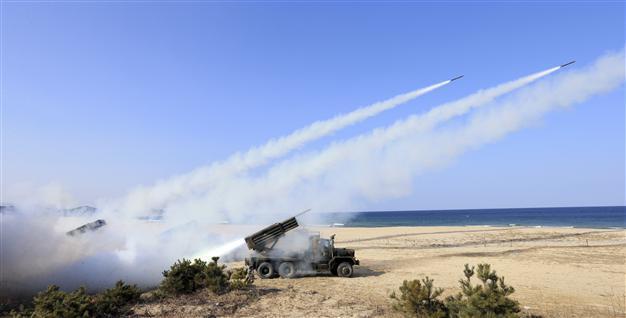North Korea fires short-range missiles, South says 'provocative'
SEOUL - Agence France-Presse

South Korean Army's 130mm multiple rocket launchers fire live rounds during an exercise against possible attacks from North Korea in Goseong, South Korea, Monday, March 3, 2014. AP Photo
North Korea fired short-range missiles into the sea off its eastern coast for the second time in a week March 3, prompting a warning from South Korea of "reckless provocation."
The missile tests have clearly been timed to coincide with annual South Korea-U.S. military exercises which kicked off a week ago and run until mid-April.
Two missiles were fired March 3 and both flew around 500 kilometres into the Sea of Japan, according to South Korea's Defence Ministry.
Four short-range Scud missiles were fired in similar fashion last week.
Both tests were condemned by Seoul, which urged the North to cease all testing immediately and said it would consider calling for sanctions.
"The North is taking a double-faced stance by making conciliatory gestures on one hand and pushing ahead with reckless provocation on the other," said Defence Ministry spokesman Kim Min-Seok.
The Scuds are at the longer edge of the short-range spectrum, with an estimated reach of 300-800 kilometres - capable of striking any target in the South.
It is not unusual for North Korea to carry out such tests, which often go unreported by South Korea. But Kim said the Scud firings were of particular concern.
"We believe that the North is testing various ballistic missiles with various ranges as a show of force to threaten us," he said.
Drills amid thaw Washington initially played down last week's firings, but later suggested they violated U.N. sanctions imposed on the North's missile programme.
U.N. Security Council resolutions prohibit North Korea "from launching any ballistic missile, and this includes any Scud missile", Pentagon spokesman Colonel Steven Warren said Feb. 28.
Pyongyang routinely condemns the South-US joint exercises as rehearsals for invasion.
Last year they coincided with a sharp and unusually protracted surge in military tensions, that saw North Korea issuing apocalyptic threats of pre-emptive nuclear strikes.
By contrast, this year's drills began as relations between Seoul and Pyongyang were enjoying something of a thaw.
They overlapped with the end of the first reunion for more than three years of families divided by the Korean War - an event that raised hopes of greater cross-border cooperation.
Pyongyang had initially insisted that the joint exercises be postponed until after the reunions finished. But Seoul refused and - in a rare concession - the North allowed the family gatherings on its territory to go ahead as scheduled.
Last week also saw an incursion by a North Korean patrol boat across the disputed Yellow Sea border that has been the scene of brief but bloody naval clashes in the past. No shots were fired and the vessel retreated to its side of the boundary after repeated warnings from the South Korean navy.
From March 3, South Korea launched a two-day live-fire exercise involving an army artillery, naval ships and jet fighters to test their readiness against a North Korean incursion off the east coast, the South's defence ministry said. It declined to confirm a Yonhap news agency report that the exercise also involved drones, multiple rocket launchers and various other weapons.
